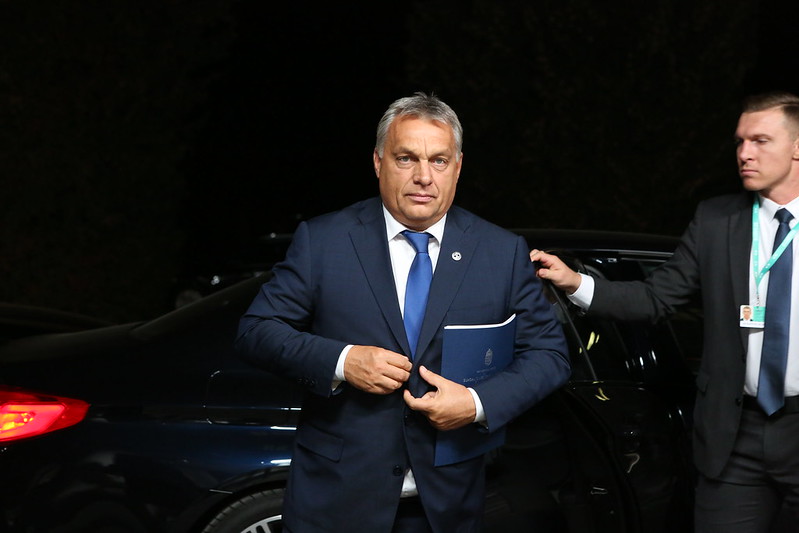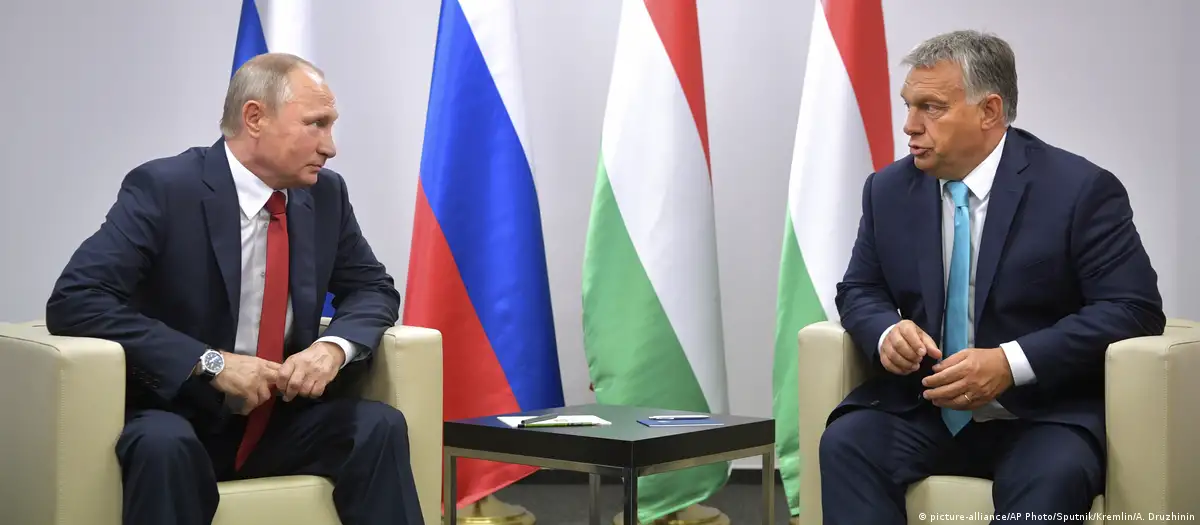By Phaidra Chrysostali,
In February 2022, Russia invaded Ukraine causing an immediate crisis that the European Union had to solve. The EU and its members have strongly condemned Russia’s violent acts against Ukraine and the illegal annexation of Ukraine’s Donetsk, Luhansk, Zaporizhzhia, and Kherson regions. Since then, the European Council and the Council of the European Union have been holding meetings to discuss the situation in Ukraine and tackle the crisis. As a response, the European Union has expanded sanctions and adopted restrictive measures against Russia and at the same time has provided Ukraine with humanitarian, political, financial, and military aid. These sanctions were implemented to show that the European Union does not tolerate actions of violence and create a common front in support of Ukraine, a front expected to be followed by every European member.
Unfortunately, this wasn’t the case with Hungary, as it followed a different approach. As European allies sent an immense number of weapons to Ukraine and tried to minimize their dependence on Russian energy, Hungary was unwilling to follow the EU’s sanctions against Russia and adopted a non-intervention policy, claiming that interference may only cause more problems. The controversial stance of the Hungarian president, Viktor Orbán, raised questions among the EU members on whether there is a growing “Pro-Russian” sentiment among the Hungarian citizens.
In addition, concerns have been expressed repeatedly by the Members of the European Parliament (MEPs) over the deterioration of EU values in Hungary as well as the poor quality of the Hungarian legislative system. The EU fears that the Hungarian government tends to deviate from EU values since it has adopted laws without sufficient parliamentary scrutiny nor public consultation; besides others, it aims to undermine the freedom of expression, LGBTIQ+ rights and violates the teachers’ social and labor rights. Despite the EU concerns, the Hungarian government proceeds to maintaining friendly relations with states regarded as the EU’s biggest “enemies” such as China, Russia, and Turkey, whose values pose a threat to the democratic and liberal values of the EU and supports anti-EU campaigns which aim to divert attention away from this lack of European compliance and systemic corruption. As a result, MEPs have observed the government’s desire to become a more authoritarian regime through various acts of intimidation and have urged the government to bring elections in line with international standards, especially in light of the upcoming European elections in 2024. Additionally, they have decided to refrain from approving the Hungarian RRF plan until Hungary complies fully with all relevant European Semester recommendations and applies the Common Provisions Regulation and the Financial Regulation more stringently in order to tackle any misuse of EU funds for political motives. On the contrary, President Orbán seems to be ignoring all of the above warnings and extends the resentment of Western progressivism, especially now that all European countries need to present a common front against Russia’s violent acts.

As Western weapons and tanks come to Ukraine’s rescue, we observe a series of statements made by the Hungarian president, openly questioning Ukraine’s viability as a sovereign state while covering the streets of Budapest with hundreds of anti-sanctions billboards. Besides the clear growing gulf between Orbán and the rest of the EU members and NATO allies, the Hungarian president proceeded in suggesting that Ukraine should just stop fighting since it is only a matter of time before Russia to take over, characterizing it as “the land of nobody”.
Regarding the implemented sanctions, Orbán has repeatedly refused to allow arms shipments to pass through Hungary to Ukraine and has concluded a new energy deal with the Kremlin, claiming that restraints on Russian oil and gas would be detrimental to Hungary’s economy. Arguably, Hungary protects the interests of third countries by delaying Sweden’s accession to NATO which would increase the EU’s power crucially and at the same time irritate Russia, since President Putin has expressed his opposition to sharing its borders with NATO members. Therefore, Hungary’s behavior raises questions and concerns among the European institutions on how they can avoid such controversial acts and make sure that in the future, major decisions will not be dependent on states that deviate from their values.
But how can the EU keep states like Hungary in line and protect its agenda from authoritarian regimes such as Russia? Unfortunately, this is a challenging subject that even the EU hasn’t solved but there are a few suggestions that may improve the EU’s cooperation with states that tend to undermine its goals and security. First, the EU should continue to work with governments in these regions to foster their resilience to external pressures and create the conditions for trusting relations that will offer stability. The EU in cooperation with its members can address these countries’ existing dependencies on Russia, especially in areas such as energy, finances, and investment and at the same time replace weak institutions and corruption that allow Russia to exploit and expand its influence. Second, the EU must alter its system when it comes to decision-making and block the extreme minority from delaying major collective decisions that further promote the EU’s agenda; for instance, Hungary has been demanding billions in exchange for lifting vetoes on everything from Ukraine aid to a global corporate tax deal which puts the EU in an extremely difficult situation and dependency on Hungary. Third, based on the aforementioned, if a European country violates the rule of law, which Hungary has done numerous times, then the EU should remove the country’s right to vote and participate in decision-making and create an institution where states with opposed opinions can go directly and express their concerns that will be dealt accordingly.
In conclusion, the European Union needs institutions that will be able in the future to confront European members who will attempt to delay its plans and threaten its security. Hungary has been showing many signs of problematic behavior that does not represent the EU or what it stands for. It is crucial for members to always obey the rule of law and not be influenced by defective states like Russia. Therefore, such behaviors should not be allowed or tolerated.
REFERENCES
- Orbán Is Telling Ukraine to Quit, politico.eu, Available here
- One Step Beyond: Why the EU Needs a Russia Strategy, ecfr.eu, Available here
- MEPs: Hungary Can No Longer Be Considered a Full Democracy, europarl.europa.eu, Available here
- Hungary and Poland Plans Should Be Approved Only If Concerns Are Addressed, europarl.europa.eu, Available here
- Hostage Diplomacy: Budapest Blackmails Brussels into Releasing Billions, politico.eu, Available here




